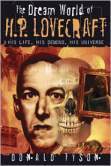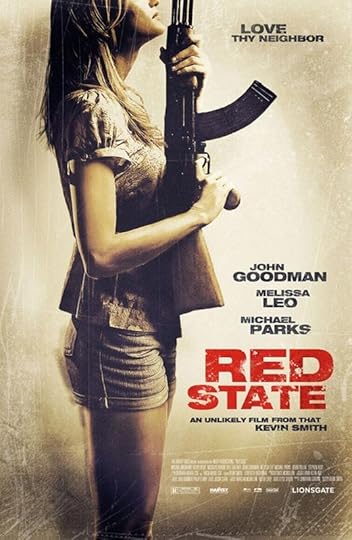Matt Moore's Blog, page 20
November 8, 2011
Writing in the First Person Point of View (Part 3/3) – Motivation & past vs present tense

Who is telling the story... and to whom?
In the first part of this three-part series on first person narrative, I talked about why you should use first person narration and how it's different than third person point of view. Part two covered how the words you choose for the narrator develops them as a character, and how who is telling the story to whom is important in shaping the narrative.
This post concludes the series and deals with the narrator's motivation for telling the story and the importance of using first person past tense versus first person present tense.
Why is the narrator telling the story
Before writing in the first person, you must understand why the narrator is telling the story.

Did your narrator survive a haunted house only to be forced back in?
In the works of Lovecraft and Poe, often is it some kind of warning or catharsis. Other stories take the form of letters or journal entries. These reasons shape the story's structure.
A warning―I went into that haunted house and barely survived, so no one should go in―would start with that warning. From there, the narrator can explain the back story.
A series of letters, though, would likely slow build over time.
But why the story is being told dictates its climax. If it's a love story, it must end with the culmination of that love. A love story where the lovers come together halfway through the tale is not a true love story. All stories need tension that is resolved in the climax. So know why the narrator is driven to tell the story, which would end with them getting to purpose of the tale.
When did the story take place and when is it being told?
The last question to ask yourself is when did the story take place in relation to its telling?
That is, first person present tense or first person past?
As with third person by default, if the story is told first person is should be past tense. Usually, we tell a story after it's happened.
[image error](There does seem to be a hipster rebellion against this reasoning with stories told first person present tense for no other reason then just to different. [Full disclosure: About half of my published works are first person present tense, but for good reasons. And, those are the works that are published. The majority of my writing is third person.) While you can tell your story however you wish, understand editors have seen plenty of stories that try to be "different." "Different" does not make a story any better.)
 Why the narrator is telling the story also relates to present or past tense. Going back to Poe and Lovecraft, the motivation of the character is to rely some horrible event that has already happened, so naturally past tense. As well, consider most stories begin in seemingly normal situations where something occurs that forces conflict. So it doesn't make sense to begin a story in present tense under normal circumstances since no one narrates their day-to-day life hoping a worthy story comes along.
Why the narrator is telling the story also relates to present or past tense. Going back to Poe and Lovecraft, the motivation of the character is to rely some horrible event that has already happened, so naturally past tense. As well, consider most stories begin in seemingly normal situations where something occurs that forces conflict. So it doesn't make sense to begin a story in present tense under normal circumstances since no one narrates their day-to-day life hoping a worthy story comes along.
So, why tell a story in the present tense? The main reason is to tell a story as it's happening. Past tense allows for flashbacks and introspection, but some stories demand to be told as they're happening without flashbacks, forcing the reader to keep up and experience a situation as it unfolds. It also provides an immediate, you-are-there telling experience.
But considering this rationale for present tense, the story must begin at a noteworthy event―a discovery, "I'm pregnant," a sudden explosion.
 Another reason for present tense is your character is in real danger and might not survive the story. A story told first person past tense indicates the main character will survive. (If you do to tell a story in the first person past tense, don't kill your character at the end. That's cheating.)
Another reason for present tense is your character is in real danger and might not survive the story. A story told first person past tense indicates the main character will survive. (If you do to tell a story in the first person past tense, don't kill your character at the end. That's cheating.)
As well, present tense may reflect the character's mentality. She lives in the moment, either because she's a thrill seeker, is someone who doesn't look back, or is a raving psychopath with no regrets and can't think more than a few seconds ahead.
Further, the main character is going through changes and is unable to appreciate or remember what has happened to them, such as "Flowers for Algernon" (or my short story "The Weak Son" in Tesseracts Thirteen).
Wrap-up: Use first person properly
First person narration, when used properly, can be a very powerful element to your story telling through immediacy and developing your character in a way third-person narrative can't do. However, you must keep in mind:
How does first person writing add to the story (setting, plot, theme, etc.), such as show-don't-tell
What information would your narrator know and not know
What words would your main character use and sensory detail would he/she/it describe
Is the narrator reliable or has her/his/its perceptions coloured the plot… or is the narrator insane
Who is telling the story—the main character or a bystander? And who are they talking to and why? What would the narrator expect the listener to know?
Is the story taking place now (present tense) or has it already happened (past tense)








November 3, 2011
Writing in the First Person Point of View (Part 2/3) – Choosing words & who is talking to whom
 In the first part of this three-part series on first person narrative, I talked about why one should use the first person narration and why it is different than third person point of view.
In the first part of this three-part series on first person narrative, I talked about why one should use the first person narration and why it is different than third person point of view.
This post continues these differences and addresses the first of three questions to ask yourself when writing in the first person: Who is telling the story to whom?
First person narrator provides the ultimate show don't tell. Consider third person:
Casey paced, considering her options. There was still time to run, but where? How far could they get in that beat up truck? She stopped, turned and saw John looking at her.
This could become first person as:
We could run. Still time, right? But that truck. It wouldn't make it far. And shit, even if it was brand new I didn't know where to go. Something pulled my gaze left. I stopped― had I been pacing? Was that why John was watching me?
Or it could be:
I knew we could run, but the question was could we find someplace safe. We had enough time to get ahead of them―that wasn't the issue. What was the issue was how far that beat-up truck would make it even if we had a sanctuary to head for. I caught John watching me and realized I'd been pacing.
[image error]These two examples present two very different narrators, allowing you to develop the character simply through vocabulary and how they would interpret an event. Yet still, we have crucial pieces of information about the truck, a conflict, timing, and a character named John.
Finally, first person narration offers you the chance for the classic unreliable narrator. (If you don't know what the unreliable narrator is, it's too long to go into here. Drop me a note in the comments if you want to see a post about this.) "The Yellow Wallpaper" is a great example of this.
Who is telling the story… and to whom?
Before writing a story in the first person, ask yourself: Who is narrating the story and who are they talking to?
I'll cover the reasons for why they're telling the story below, but knowing narrator and audience is essential keep your story on track and avoid unnecessary (and unrealistic) exposition.
First, is your narrator the main character/protagonist or a bystander? Both offer their advantages.
A bystander allows us to consider the story as a third party―seeing events played out that we are not involved in. The question, though, is why not tell the story from the third person. The answer might be how a normal person interprets extraordinary events.

Imagine a Batman story told from the point of view of the victim of a mugging who is rescued by the Dark Knight. Would he feel gratitude? Or, what if he felt sickened by the excessive violence employed by the Caped Crusader? If the latter, what are you saying thematically?
Second, what does the narrator expect the audience to know? If you have a story set in the past where the narrator talking to someone her age, she would not describe the norms and terms since both would know them. (This is called "As you know, Bob," as in "As you know Bob, back in the 20s alcohol was illegal.") However, if the narrator was a grandfather explaining something to his granddaughter, then a certain level of "So I tied an onion on my belt, which was the style at the time" exposition is justified. (But, he would not say "As you know, I'm your grandfather.")
But keep in mind that while a third party narrator is expected to explain certain things to the audience, how much do you personally explain to your friends when you're telling them a story? Probably only enough to keep the story moving forward.
Lastly, what is the reason the narrator is telling a story to someone? My reasons for explaining a conflict at work to my wife are different than telling them to my boss―venting/sympathy in the first case; wanting resolution in the second. My goals affects how I tell the story.
In the last part of this series, I'll delve into two others questions to ask yourself about first person narrators: why is the narrator telling this story, and when did the story take place in relation to the telling of it?








Writing in the First Person Point of View – Who, Why & When (Part 2/3)
First person narrator provides the ultimate show don't tell. Consider third person:
Casey paced, considering her options. There was still time to run, but where? How far could they get in that beat up truck? She stopped, turned and saw John looking at her.
This could become first person as:
We could run. Still time, right? But that truck. It wouldn't make it far. And shit, even if it was brand new I didn't know where to go. Something pulled my gaze left. I stopped― had I been pacing? Was that why John was watching me?
Or it could be:
I knew we could run, but the question was could we find someplace safe. We had enough time to get ahead of them―that wasn't the issue. What was the issue was how far that beat-up truck would make it even if we had a sanctuary to head for. I caught John watching me and realized I'd been pacing.
[image error]These two examples present two very different narrators, allowing you to develop the character simply through vocabulary and how they would interpret an event. Yet still, we have crucial pieces of information about the truck, a conflict, timing, and a character named John.
Finally, first person narration offers you the chance for the classic unreliable narrator. "The Yellow Wallpaper" is a great example of this. (If you don't know what the unreliable narrator is, it's too long to go into here. Drop me a note in the comments if you want to see a post about this.)
Who is telling the story… and to whom?
Before writing a story in the first person, ask yourself: Who is narrating the story and who are they talking to?
I'll cover the reasons for why they're telling the story below, but knowing narrator and audience is essential keep your story on track and avoid unnecessary (and unrealistic) exposition.
First, is your narrator the main character/protagonist or a bystander? Both offer their advantages.
A bystander allows us to consider the story as a third party―seeing events played out that we are not involved in. The question, though, is why not tell the story from the third person. The answer might be how a normal person interprets extraordinary events.

Imagine a Batman story told from the point of view of the victim of a mugging who is rescued by the Dark Knight. Would he feel gratitude? Or, what if he felt sickened by the excessive violence employed by the Caped Crusader? If the latter, what are you saying thematically?
Second, what does the narrator expect the audience to know? If you have a story set in the past where the narrator talking to someone her age, she would not describe the norms and terms since both would know them. (This is called "As you know, Bob," as in "As you know Bob, back in the 20s alcohol was illegal.") However, if the narrator was a grandfather explaining something to his granddaughter, then a certain level of "So I tied an onion on my belt, which was the style at the time" exposition is justified. (But, he would not say "As you know, I'm your grandfather.")
But keep in mind that while a third party narrator is expected to explain certain things to the audience, how much do you personally explain to your friends when you're telling them a story? Probably only enough to keep the story moving forward.
Lastly, what is the reason the narrator is telling a story to someone? My reasons for explaining a conflict at work to my wife are different than telling them to my boss―venting/sympathy in the first case; wanting resolution in the second. My goals affects how I tell the story.
In the last part of this series, I'll delve into two others questions to ask yourself about first person narrators: why is the narrator telling this story, and when did the story take place in relation to the telling of it?








October 31, 2011
Writing in the First Person Point of View (Part 1/3) – Why use it & what does it add
A big challenge of writing in the first person is your narrator is also a character. As well, you need a reason to use first person and then understand who, why and when this story is being told.
In third person writing, the narrative voice can reflect a character (in third person limited) or be its own (with an omniscient narrator). But you the author (and narrator) are free to tell what needs to be told.
In first person, the narration must reflect and develop the character. (More on character development below and in other posts.) Having an uneducated person with an expansive vocabulary or a child reasoning with abstract ideas doesn't work. Even if the story is set in the past and the narrator has changed since then, this incongruity will take the reader out of the story.
(Writing second person narrative will not be discussed here. And unless you are a master storyteller, please don't try it.)
What's more, what is shown and described to the reader must make sense considering who the narrator is. You can't describe the history of a place unless the narrator knows it. What's happening in another room is only speculation based on what the narrator can hear. Someone landing in a setting they are unfamiliar with will just see (smell and hear) a jumble of confusion.
First Person is not Third Person with "I"
In my opinion, all stories should be told in the third person unless there is a pressing reason to tell them first person. So the question is: What does a character narrating the story add?
One reason is the inner thoughts and conflicts of the character. Someone once said "film is what happens between people; prose is what happens within them." While third person limited can do this, first person allows you to chose the words, style and patterns that both develop your character and convey a story.
And when I say "story," remember that story is more than plot. Think back to those things we learned in English class. A story is made up of:
Plot – What happens
Setting – Where and when does it happen
Characters – Who does it happen to
Tone/style – How does it happen
Theme – Why is it happening & what are you really trying to say
So with first person, how are you developing character and contributing to theme, setting or plot by telling the story first person? Some ideas are your narrator:
Has an extra sense others lack, allowing her to see ghosts
Is the only survivor of some event and returns to its location, bringing a sense of dread
Is going through an internal crisis that mirrors the external conflict of the plot
Your narrator's senses also come into play. While you can certainly describe sights, sounds, smells and texture in third person, using first person provides a context―how would the narrator relate a spaceship to the reader? If spaceships are everyday occurrences, probably in plain language. If the narrator's a 12th century serf, then as just shapes and surfaces without a cohesive idea.
To say nothing of what senses are described. We are visual creatures, so in our moment-to-moment lives we tend to ignore sounds and smells unless they are intrusive . So what sounds or smells would penetrate the narrative flow and have the narrator mention them? Consider:
Fresh coffee brewing in the morning
A scream
A sudden drop in temperature
By having the narrator note these sensory details, it signals to the reader to pay attention since they are not normal. As well, the details your narrator notice and describe say about the narrator as a character.
In the next part of this series, I'll continue exploring how writing in the first person point of view is different than third person narration. Plus, discuss how knowing who is telling the story is essential to its structure and detail.


 [image error]
[image error]
[image error]
[image error]

 [image error]
[image error]
Writing in the First Person Point of View – Who, Why & When (Part 1/3)
A big challenge of writing in the first person is your narrator is also a character. As well, you need a reason to use first person and then understand who, why and when this story is being told.
In third person writing, the narrative voice can reflect a character (in third person limited) or be its own (with an omniscient narrator). But you the author (and narrator) are free to tell what needs to be told.
In first person, the narration must reflect and develop the character. (More on character development below and in other posts.) Having an uneducated person with an expansive vocabulary or a child reasoning with abstract ideas doesn't work. Even if the story is set in the past and the narrator has changed since then, this incongruity will take the reader out of the story.
(Writing second person narrative will not be discussed here. And unless you are a master storyteller, please don't try it.)
What's more, what is shown and described to the reader must make sense considering who the narrator is. You can't describe the history of a place unless the narrator knows it. What's happening in another room is only speculation based on what the narrator can hear. Someone landing in a setting they are unfamiliar with will just see (smell and hear) a jumble of confusion.
First Person is not Third Person with "I"
In my opinion, all stories should be told in the third person unless there is a pressing reason to tell them first person. So the question is: What does a character narrating the story add?
One reason is the inner thoughts and conflicts of the character. Someone once said "film is what happens between people; prose is what happens within them." While third person limited can do this, first person allows you to chose the words, style and patterns that both develop your character and convey a story.
And when I say "story," remember that story is more than plot. Think back to those things we learned in English class. A story is made up of:
Plot – What happens
Setting – Where and when does it happen
Characters – Who does it happen to
Tone/style – How does it happen
Theme – Why is it happening & what are you really trying to say
So with first person, how are you developing character and contributing to theme, setting or plot by telling the story first person? Some ideas are your narrator:
Has an extra sense others lack, allowing her to see ghosts
Is the only survivor of some event and returns to its location, bringing a sense of dread
Is going through an internal crisis that mirrors the external conflict of the plot
Your narrator's senses also come into play. While you can certainly describe sights, sounds, smells and texture in third person, using first person provides a context―how would the narrator relate a spaceship to the reader? If spaceships are everyday occurrences, probably in plain language. If the narrator's a 12th century serf, then as just shapes and surfaces without a cohesive idea.
To say nothing of what senses are described. We are visual creatures, so in our moment-to-moment lives we tend to ignore sounds and smells unless they are intrusive . So what sounds or smells would penetrate the narrative flow and have the narrator mention them? Consider:
Fresh coffee brewing in the morning
A scream
A sudden drop in temperature
By having the narrator note these sensory details, it signals to the reader to pay attention since they are not normal. As well, the details your narrator notice and describe say about the narrator as a character.
In the next part of this series, I'll continue exploring how writing in the first person point of view is different than third person narration. Plus, discuss how knowing who is telling the story is essential to its structure and detail.


 [image error]
[image error]
[image error]
[image error]

 [image error]
[image error]
October 17, 2011
SFContario Schedule
I've received my schedule for SFContario, the SF convention taking place in Toronto, November 18-20 where the Aurora Awards will be presented.
Looks like Saturday, November 19 will be a busy day for me. I am on three panels plus an autograph sessions. I am hoping to also score a reading, but we'll see.
Below is my schedule:
11 AM
Criticism and Critique: Critics in the 21st Century
Developments in social media and web 2.0 technology continue to blur the line between amateur and professional critics. As North American colleges and universities produce record numbers of graduates, the media consuming public is transforming itself into something that feels it ought to be included in larger critical conversations. Our panelists explore how professionals and amateurs work together to evaluate genre media.
Panelists: James Nicoll(M), John Scalzi, Matt Moore, Elizabeth Hirst
Noon
Cockpit: Rules of Engagement
Cockpit: The Rule of Engagement is an award winning indie short film
written and directed by Jesse Griffith. Starring Ronny Cox (Deliverance, Robocop, Total Recall) Hellena Taylor (Bavonetta, Saboteur, Stargate Atlantis) and Karl Champley (Wasted Spaces, DIY to the Rescue) the film made its debut at Comicon as a proof of concept for a feature length screenplay. Both stories are set on the front lines of a war against an enemy that uses mind control and subversion to turn humanity against itself. After a premiere Canadian screening, this panel will explore the themes and motifs of the film as well as discussing the challenges of fast-paced story telling within the confines of a cerebral space opera format.
Panelists: Adam Shaftoe(M), J M Frey, Matt Moore
1PM
Social Media and how to use it
Writers know the internet, but not all writers take advantage of its full potential. With the emergence of social media potential readers are just a click away. What is social media about and how can it help you? What should you do and what are the pitfalls to avoid?
Panelists: Karen Dales(M), Suzanne Church, Jonathon Crowe, Matt Moore, Brett Savory
4PM
Autograph session with Julie Czerneda and Robert Charles Wilson
AE: The Canadian Science Fiction Review will also be hosting a party, but I'm not sure yet on the timing.
More to come as I learn it.
[image error]
 [image error]
[image error]

 [image error]
[image error]


October 16, 2011
Voting in the Prix Aurora Awards Extended to Monday, October 17
A quick note to let you know that voting in the Prix Aurora Awards has been extended on Monday, October 17 at midnight Pacific time (3AM Eastern time). It's not too late to vote if you ran out of time.
My short story "Touch the Sky, They Say" has been nominated in the Best English Short Story category. Previous winners in this category include big names like Robert J. Sawyer and Peter Watts as well as my friends David Nickle, Douglas Smith and Hayden Trenholm.
This year, I have a number of friends who are also up for Auroras:
Hayden Trenholm ("The Burden of Fire") and Suzanne Church ("Destiny Lives in the Tattoo's Needle") are also nominated in the Best Short Story category
Marie Bilodeau (Destiny's Blood) and Hayden Trenholm (Stealing Home) are nominated for Best Novel
Sandra Kasturi ("Let the Night In") and Helen Marshall ("Waiting for the Harrowing"), fellow ChiZine Publications staff, for best poem
Douglas Smith (for this short story collection Chimerascope), Diane Walton (for On Spec magazine) and Brett Alexander Savory (for co-editingTesseracts Fourteen) for Best English Related Work
Erik Mohr for Best Artist
Sandra and Helen for best Best Fan Organizational for the Toronto SpecFic Colloquium
I have posted all details on how to vote and copies of my story (including a PDF and MP3) or you can go to the Aurora site for full info.
Winner will be announced Sunday, November 20 at SFContario, a science fiction convention in Toronto from November 18–20. I will be there!
Also, I have received my schedule for SFContario and will be posting it soon.






 [image error]
[image error]
October 7, 2011
Review: Kevin Smith's Horror Movie Red State
(This review is spoiler free.)
 Ironically, on election day in Ontario (where I live), I went to see Red State, a film very much dealing with democratic rights: freedom of speech, to bear arms, religious beliefs.
Ironically, on election day in Ontario (where I live), I went to see Red State, a film very much dealing with democratic rights: freedom of speech, to bear arms, religious beliefs.
The story is fairly simple and takes place over about 24 hours. In Somewhere USA, three teenage boys meet an older woman online and arrange to meet to have sex. Instead, the meet-up is a trap where the boys are captured by the Five Points Church, a Fred Phelps-esque family of religious zealots and gun nuts. When one of the boys tries to escape, it triggers a hostage situation and stand-off with ATF agents, led by John Goodman. During the stand-off, things go from bad to worse to holy shit.
To get this out of the way—yes, this is written and directed by Kevin Smith (Clerk, Chasing Amy, Cop Out). While Smith has been dismissed as nothing more than a purveyor of dick-and-fart jokes, this films shows he is a serious filmmaker and draws on his strengths:
Whip-smart dialogue
The ability to juggle a large cast of characters without confusing the viewer
Having a number of different story elements collide and intertwine to send characters further and further into a meat grinder (played for humour when it's Dante Hicks, but not here)
The tone and feel of the film is nothing like Smiths' comedic works. This is a dark, bold, chilling film. While there are a few laughs, it's gallows humour. The acting is top-notch from its leads to its bit parts. While one good performance is the result of an actor, when it's the cast it's because a director yanked those performances out of them. The pacing and tension are nail-biting. The film's visual style, thanks to David Klein (who got his start on Smith's debut Clerks., which is usually mocked for it stationary camera), draws you into a world of deepening madness.
One criticism I have is that the beginning of the film is slow—another Smith hallmark—but is necessary to establish the three boys as genuine, sexually curious young men who urge each other on instead of taking a step back to think about what they're doing. We all knew guys like this. Maybe you were one of them. This time establishes them not as stereotypes out of Porky's, but real guys.
Which makes what happens to them all the more difficult to watch. I won't give anything anyway, but a true strength of this film is you do not know what is going to happen scene to scene, moment to moment. Unlike the predictable "final girl" formula of horror movies, Smith breaks a lot of narrative rules here. The character you're following who enters a scene might not make it through alive.
Like The Texas Chainsaw Massacre and The Devil's Rejects, the low budget of this films adds to its look. Its practical sets and natural lighting ground you in the reality of the situation (rather than million dollar effects reminding you that you're watching a movie). And for a horror movie, there is not a lot of gore, but the little that is used is shocking, violent and jarring. Instead, the horror is how easily violence comes. And how unfair and random it can be. (Several times, a woman behind me shouted "No!" in a choked voice at acts of horrific, senseless brutality.) But do not mistake this for torture porn. There is a story here. These are real characters. Smith is making a point. The sound of the gunshot that kills someone—and the fact of who fired and why—punches you harder in the gut than the half second of blood you see.
But the brutality committed is not just by the Five Points Church. Smith certainly has a bullseye aimed at Christian fundamentalists who feel one Bible verse (Leviticus 20:13) trumps another (Exocus 20:13). But the ATF are hardly the heroes here—perhaps another swipe at another shade of Republicanism. The orders and actions of Goodman and his team become equally brutal and upsetting.
And perhaps that is what makes this film so effective as true, disquieting horror. There are no heroes. There is no one we can latch on to as our moral compass. Faced with an impossible situation, all the characters simply react out of panic, not thinking about what they are doing in a second-by-second fight to keep living in the vain hope salvation will come. (And let's just say the word "salvation" was intentionally chosen as a mini-spoiler.) While the will to live is noble, doing so at the expense of your friends or those you are sworn to protect provokes a disquieting realization about human nature.
And if there is a message in Red State, one echoed by John Goodman's character in a story he recounts, it's that while Christianity holds us up to be superior to the beasts, in truth we're no better.








September 30, 2011
New Article on Page of Reviews
I have an article up on Adam Shaftoe's Page of Reviews about the divisions and definitions in genre literature, and why it might be time for us to start thinking about what makes a good story rather than fighting over whether it is or isn't sci-fi.
It begins:
In August, AE: The Canadian Science Fiction review published my short story Ascension, which is about the zombie apocalypse told from a zombie's point of view. Some would say this alone makes it a horror story. Yet it also deals with mass consciousness and the transcendence of the physical to the purely mental―the zombie apocalypse as the singularity―topics normally found in science fiction.
So, is it then a sci-fi story?
My question is: does it even matter? And are these divisions hurting us as a community?
Head over to Page of Reviews to read it all and let Adam know you were there by leaving a comment.








September 26, 2011
My article on "Dark SF" available on AESciFi.ca
An article I wrote for AE: The Canadian Science Fiction Review entitled "Not in Utopia Anymore: The Rise of Dark SF" is now available. It covers what I think "dark sf" means: rather than idealism, a realism in science fiction that reflects the cynical, postmodern world we live in.
If you enjoy the post, let AE know by leaving a comment on their site.
And if you haven't already, please vote in the Aurora Awards! I've posted full details on how to vote and some background on why I wrote my nominated story, "Touch the Sky, They Say," which you can read for free on the AE site.
Or, click on the spooky hand reaching for a grey skyline over on the right. ->











